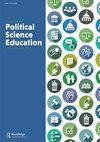Building Political Discourse Skills: Students as Teachers
IF 0.6
Q3 POLITICAL SCIENCE
引用次数: 0
Abstract
AbstractIn a highly polarized political environment, political discourse on divisive topics is all the more important. Heeding the many calls for higher education to teach political discourse skills, this study investigates the impact of political discourse lessons in a college-level, political science classroom. Further, it explores the effectiveness of student-peers as teachers. The study finds peers, compared to faculty, are better able to relate to students, and this strength is ideal for teaching subjects that require social connections such as the active listening and perspective taking techniques. Discussion of sensitive political topics can easily lead to discomfort and uneasiness. Our findings suggest that student learners may be more receptive to peer-leaders than to instructors when it comes to such situations. Further peer-teachers experienced increased comfort levels when involved in controversial political discussions and increased ability to engage in political dialogue.Keywords: Political discourseclassroom discussionstudent-instructorspeer teachingcritical thinkingperspective takingactive listening Notes1 Peer teachers in our study were required that to complete IRB training for human subjects and went through rigorous training to become qualified as peer-teachers (see Appendices A and B, supplementary material). While in many settings, peer-teachers also take part in assessment activities, our study limited peer teachers to providing classroom lectures on content.2 This study received all required Institutional Review Board (IRB) approvals under IRB number FAC20180106E.3 Non-peer, faculty members continued to teach all other course lessons.4 See Appendix A (supplementary material) for details on research methodology and Appendix B (supplementary material) for details on student research training.5 See Appendix A (supplementary material) for details.6 The video is available online: https://www.youtube.com/watch?v=Fo2YF5n_D047 See Appendix A (supplementary material) for details.Additional informationNotes on contributorsLynne Chandler GarciaLynne Chandler Garcia is an Associate Professor of Political Science at the U.S. Air Force Academy. Her areas of research within the scholarship of teaching and learning include civil discourse, empathy and efficacy in political behavior, and the art of pedagogy for underprivileged learners. Her foreign policy publications range in topics from military operations in Afghanistan and Iraq, supply chain issues, space policy, and civil-military relations.Stacy UlbigStacy G. Ulbig currently holds the position of Professor of Political Science at Sam Houston State University. Her research focuses on questions about political psychology, political behavior, and media politics. She regularly teaches undergraduate courses in American Government, Texas Government, Attitudes & Behavior, Politics & the Media, and Statistical Methods.构建政治话语技巧:学生即教师
摘要在高度两极化的政治环境中,关于分歧话题的政治话语显得尤为重要。考虑到许多要求高等教育教授政治话语技巧的呼声,本研究调查了政治话语课程在大学水平的政治科学课堂上的影响。此外,它还探讨了学生同伴作为教师的有效性。研究发现,与教师相比,同龄人更能与学生建立联系,这种优势对于教授那些需要社会联系的学科来说是理想的,比如积极倾听和换位思考技巧。讨论敏感的政治话题很容易导致不舒服和不安。我们的研究结果表明,在这种情况下,学生学习者可能比教师更容易接受同伴领导。此外,同行教师在参与有争议的政治讨论和参与政治对话的能力方面也有所提高。关键词:政治话语课堂讨论学生-教师快速教学批判性思维视角积极倾听注1我们研究中的同伴教师被要求完成人类受试者的IRB培训,并经过严格的培训成为合格的同伴教师(见附录A和B,补充材料)。虽然在许多情况下,同行教师也会参与评估活动,但我们的研究限制了同行教师在课堂上讲授内容本研究获得了所有必要的机构审查委员会(IRB)批准,IRB编号为FAC20180106E.3非同行的教员继续教授其他课程研究方法详见附录A(补充材料),学生研究训练详见附录B(补充材料)详见附录A(补充资料)视频可在网上下载:https://www.youtube.com/watch?v=Fo2YF5n_D047详见附录A(补充材料)。林恩·钱德勒·加西亚:林恩·钱德勒·加西亚是美国空军学院政治学副教授。她在教学学术领域的研究领域包括公民话语,政治行为的移情和效能,以及贫困学习者的教学艺术。她的外交政策出版物涉及阿富汗和伊拉克的军事行动、供应链问题、太空政策和军民关系。Stacy G. Ulbig,现任山姆休斯顿州立大学(Sam Houston State University)政治学教授。她的研究重点是政治心理学、政治行为和媒体政治。她经常教授美国政府、德州政府、态度与行为、政治与媒体、统计方法等本科课程。
本文章由计算机程序翻译,如有差异,请以英文原文为准。
求助全文
约1分钟内获得全文
求助全文
来源期刊

Journal of Political Science Education
POLITICAL SCIENCE-
CiteScore
1.80
自引率
36.40%
发文量
69
期刊介绍:
The Journal of Political Science Education is an intellectually rigorous, path-breaking, agenda-setting journal that publishes the highest quality scholarship on teaching and pedagogical issues in political science. The journal aims to represent the full range of questions, issues and approaches regarding political science education, including teaching-related issues, methods and techniques, learning/teaching activities and devices, educational assessment in political science, graduate education, and curriculum development. In particular, the journal''s Editors welcome studies that reflect the scholarship of teaching and learning, or works that would be informative and/or of practical use to the readers of the Journal of Political Science Education , and address topics in an empirical way, making use of the techniques that political scientists use in their own substantive research.
 求助内容:
求助内容: 应助结果提醒方式:
应助结果提醒方式:


